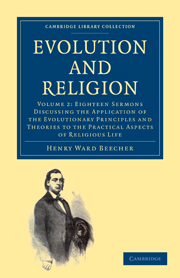Book contents
- Frontmatter
- Contents
- INTRODUCTORY: THE BACKGROUND OF MYSTERY
- I THE MANIFOLD CHRIST
- II THE CONVERSION OF FORCE
- III THE DRIFT OF THE AGES
- IV THE HIDDEN MAN
- V THE REST OF GOD
- VI GOD'S LOVING PROVIDENCE
- VII THE NEW TESTAMENT THEORY OF EVOLUTION
- VIII GOD'S GOODNESS MAN'S SALVATION
- IX POVERTY AND THE GOSPEL
- X GOD IN THE WORLD
- XI JESUS THE TRUE IDEAL
- XII THE GROWTH OF CREATION
- XIII THE BATTLE OF LIFE
- XIV THE LIBERTY OF CHRIST
- XV CONCORD, NOT UNISON
- XVI LIBERTY AND DUTY OF THE PULPIT
- XVII THE VITALITY OF GOD'S TRUTH
XII - THE GROWTH OF CREATION
Published online by Cambridge University Press: 29 August 2010
- Frontmatter
- Contents
- INTRODUCTORY: THE BACKGROUND OF MYSTERY
- I THE MANIFOLD CHRIST
- II THE CONVERSION OF FORCE
- III THE DRIFT OF THE AGES
- IV THE HIDDEN MAN
- V THE REST OF GOD
- VI GOD'S LOVING PROVIDENCE
- VII THE NEW TESTAMENT THEORY OF EVOLUTION
- VIII GOD'S GOODNESS MAN'S SALVATION
- IX POVERTY AND THE GOSPEL
- X GOD IN THE WORLD
- XI JESUS THE TRUE IDEAL
- XII THE GROWTH OF CREATION
- XIII THE BATTLE OF LIFE
- XIV THE LIBERTY OF CHRIST
- XV CONCORD, NOT UNISON
- XVI LIBERTY AND DUTY OF THE PULPIT
- XVII THE VITALITY OF GOD'S TRUTH
Summary
“Go and shew John again those things which ye do hear and see: The blind receive their sight, and the lame walk, the lepers are cleansed, and the deaf hear, the dead are raised up, and the poor have the gospel preached to them” [which is the climax].
—Matt, xi: 4, 5.“Wherefore God also hath highly exalted him, and given him a name which is above every name. That at the name of Jesus every knee should bow, of things in heaven and things in earth, and things under the earth; And that every tongue should confess that Jesus Christ is Lord, to the glory of God the Father.”
—Phil, ii: 9–11.In the order of nature, and in its primitive state, strength is the lord, and weakness is the victim. All matter that is yet under the dominion of mere physical forces goes by the way of weakness, followed by compelling strength; nor is there in mere inorganic nature a glimpse of any other thing. It is compulsion. The weak go under. When the lowest, the foundation forms of existence begin to spring up—both plants and animals in their lower conditions—the struggle for existence begins, and still the weak go under, the strong prevailing. It has been said that this is an evidence of benevolence, so that in the end they who remain will all be strong; but this is a poor consolation to any man asking, “Why were there any weak?
- Type
- Chapter
- Information
- Evolution and Religion , pp. 339 - 349Publisher: Cambridge University PressPrint publication year: 2009First published in: 1885



